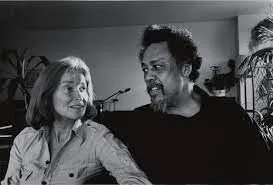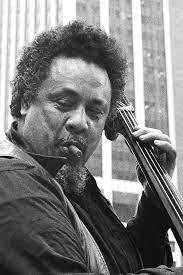The closest I ever came to meeting Charles Mingus was when I followed him up the stairs of the Jazz Workshop in Boston on a wintry Sunday afternoon in 1972. He’d just finished his matinee set, and as he headed out to Boylston Street in a belted, butterscotch-brown leather coat, he slipped on the icy sidewalk. My friend Nic and I scrambled to support him, but Mingus regained his balance on his own. The ensuing moment did not seem right for an adoring line of introduction from either of us, so we moved on in wonder over what we’d just experienced.
I saw Mingus a few times afterwards, but that afternoon at the Workshop was the most memorable, and it was the finest from a musical standpoint as well. On that occasion, the pianist was apparently late, so the show began with Mingus at the keyboard. Dannie Richmond was on drums, Lonnie Hillyer on trumpet, Charles McPherson on alto, and Bobby Jones played tenor and clarinet. Once the pianist arrived looking harried in a jacket that resembled a Boston bus driver’s, Mingus played bass from a stool at the front of the bandstand, though he stopped the music and returned to the keyboard a couple of times to illustrate something he wanted the pianist to play. I was underage at the time, and the only fake ID I carried was a 6’2” frame and a pair of sunglasses that I’d wear indoors. Whether or not that fooled anyone into thinking I was over 21 I’ll never know, but I got through the door, was served a drink, and I gloried in the experience of seeing this musical giant only an arm’s length away.
Notwithstanding the handful of concerts I attended by Mingus, had I known him, like I know Lester Young, Charlie Parker, and John Coltrane, only through recordings, I’ve little doubt that he would have been an important figure in my life. Mingus arrived at that moment when my adolescent instincts toward rebellion and individuation needed a galvanizing figure, and he was it.
Jackie McLean, who began playing with Mingus’s Jazz Workshop when he was a 24-year-old, said “Mingus gave me my exploration papers. In the interview that I conducted with Harold Bloom in 2004, the literary critic said of his late friend, “Mingus doesn’t break with the tradition, but he’s really trying to turn the whole tradition into Mingus.” I reveled in the challenge presented by Mingus’s music, which drew me right in with its deep blues expressiveness, and fascinated me with its use of dissonance and atonality; shifting time-signatures and sudden changes in tempo; and its experiments with form. Mingus’s music conveyed a wide array of moods and emotions, the lyrical juxtaposed with the sardonic (“Fables of Faubus”) and just plain funny (“Eat That Chicken”). I identified with the intense personal cry at the heart of his music; his outspoken opposition to racism and the war in Vietnam; and his efforts to address the inequities of the world, which in his case revolved mostly around the music business.
As if his music weren’t enough, Mingus was also a psychological open book. Through his liner note essays and his autobiography, Beneath the Underdog, which I read at age 17, and the documentary, Mingus in Greenwich Village, which I’ve watched numerous times, I learned of his emotional volatility, and the archetypal way he tended to frame his vulnerability. For instance, Underdog begins with Mingus likening himself to the Trinity.
“IN OTHER WORDS, I AM THREE. One man stands forever in the middle, unconcerned, unmoved, watching, waiting to be allowed to express what he sees to the other two. The second man is like a frightened animal that attacks for fear of being attacked. Then there’s an over-loving gentle person who lets people into the uttermost sacred temple of his being and he’ll take insults and be trusting and sign contracts without reading them and get talked down to working cheap or for nothing, and when he realizes what’s been done to him he feels like killing and destroying everything around him including himself for being so stupid. But he can’t—he goes back inside himself.”
Yesterday was Charles Mingus’ 90th birthday anniversary. I’ve been heartened by how prominent his music has remained since his death in 1979, largely through the work his widow Sue Graham Mingus has undertaken to perpetuate his legacy. Graham established Mingus Dynasty around 30 years ago, and subsequently formed the Mingus Big Band and Mingus Orchestra. These ensembles have kept Mingus’s music alive on record and bandstands, and the Big Band appeared weekly for over a decade at the Fez Café in New York. Graham has seen to the release of numerous concert recordings by Mingus as well. Every artist should have such a guardian.

